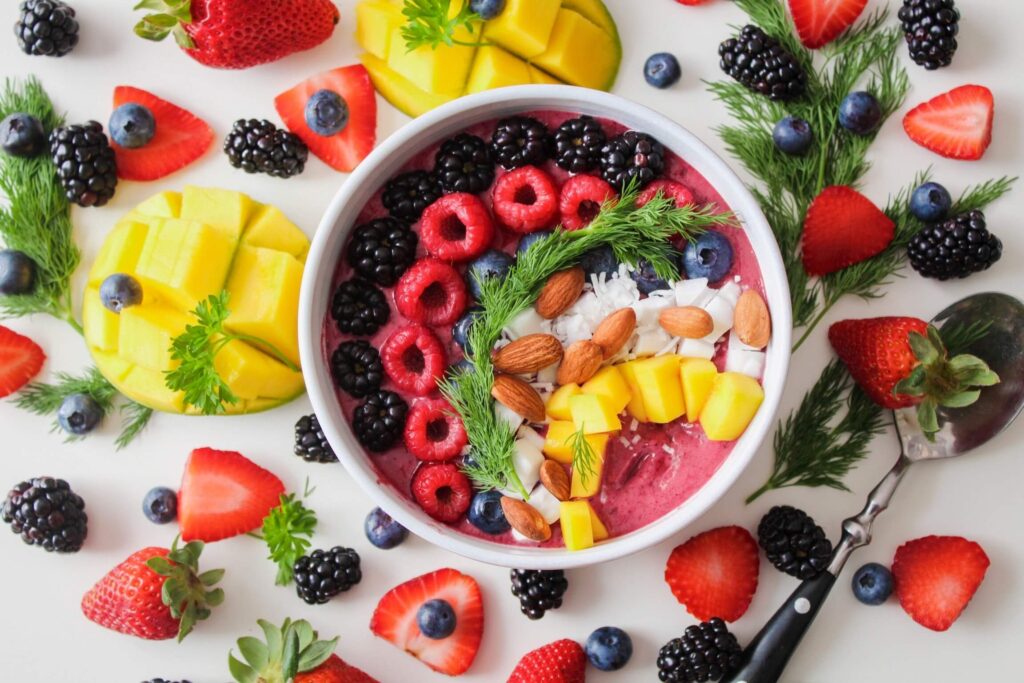Can the foods that you eat have a super impact on improving your metabolic health?
Some foods—superfoods—can optimise how you feel and how your body works. Superfoods can go a long way in improving metabolic health and body function. They can impact your metabolism in a number of ways. Simply put, superfoods give your body’s cells what they need to function at their very best.
What are superfoods?
You’ve probably heard the word superfoods often, but you may be surprised to learn that there is no formal definition of what a superfood is or isn’t. A ‘superfood’ is actually a marketing term used to describe products that companies would like to sell in larger quantities.
Superfoods are nutrient-rich health-boosting compounds that include essential fatty acids, vitamins, minerals, fibre, antioxidants and other phytonutrients. Phytonutrients are those special compounds that give plants their colour, smell and taste. For example, beta-carotene is the phytochemical that gives carrots their orange colour; lycopene is what paints tomatoes red.
Superfoods help to provide the body with energy while supporting cellular repair processes. So, while your healthcare providers might not agree on exactly which foods count as superfoods, there are benefits of including more of them in your usual diets.
What foods fall under the superfoods category?
Superfoods—even though they’re a marketing concept—provide many health benefits, and some may already be part of your diet. While superfoods include a wide range of fruits, herbs, spices and other foods, there are some common threads of how these foods can improve metabolic markers.
Here are some examples of foods that are super for your health and metabolism. Are any of these already in your kitchen?
- Berries: including blueberries, raspberries, cranberries, goji berries and strawberries
- Garlic
- Ginger
- Seeds: including chia seeds, flax seeds, hemp seeds and pepitas
- Cocoa
- Green tea
- Herbs and spices: including turmeric
As studies have proven, superfoods can improve metabolic function and your blood lab values (1). It is so exciting to see the enhancement of those measurable markers of metabolic health!
We’ll cover those links in a moment, but first, what is metabolism?
What is metabolism?
Metabolism is a word that is used often but not necessarily well understood. Metabolism refers to every single chemical process that takes place in your body to keep you alive and functioning well. While metabolism is often considered in terms of weight and weight loss, it includes far more processes (2).
Metabolism includes processes such as breathing, blinking, swallowing and every movement you do on a daily basis. The processes of digestion and absorption of food are part of metabolism, as is the use of this food to fuel all movement.
Metabolic health is described as having ideal levels of blood sugar, triglycerides, high-density lipoprotein (HDL) cholesterol, blood pressure and waist circumference, without using medications. You can measure different aspects of your metabolic health with blood lab values and other markers.
Studies in countries such as Australia show that better, more healthy dietary patterns improve individual and group metabolic profiles and BMI phenotypes.
It should be noted that diet is only one part of how well your metabolism functions daily, and other factors do play a part as well.
Your gut microbiome is also a significant factor in how healthy you are. We have an entire post on that topic, here: Gut Microbiome & Metabolic health.
What is metabolic syndrome?
Metabolic syndrome is when a person has more than one signal indicating their metabolic health has changed. With metabolic syndrome, the person has a cluster of conditions happening at the same time. Metabolic syndrome is closely correlated with obesity and may include any of the following conditions:
- Type 2 diabetes
- Hypertension (high blood pressure)
- Abdominal obesity (a larger waist circumference)
- High cholesterol
Your usual diet is one risk factor for metabolic syndrome that is modifiable. Superfoods can play a role in reducing your risk of metabolic syndrome. Let’s explore that, now.

How do superfoods help prevent metabolic syndrome?
For people with metabolic syndrome, there usually is room to improve health behaviours and lower the risk of complications down the road.
Remember that metabolic syndrome is a collection of several conditions. Lowering your risk of metabolic syndrome can include changes to any of the following markers, including blood sugar levels, blood pressure, cholesterol, heart health, obesity, a large waistline, high triglyceride levels, low HDL cholesterol levels, elevated blood pressure and elevated fasting blood sugar.
Superfoods can assist with improving many of the above metabolic health markers.
Many of the superfoods we will explore below contain polyphenols. Polyphenols can have neutralising properties for harmful free radicals that can harm cells, and they can reduce inflammation. There are more than 8000 types of polyphenols and they include four primary categories: polyphenolic amids, phenolic acids, flavonoids and others. Studies show that polyphenols may improve heart health, prevent blood clots, lower blood sugar, promote better digestion and protect the body against cancer. The best-known sources of polyphenols include red wine, dark chocolate, tea and berries, but other foods contain them as well.
Let’s see how we can introduce superfoods to reduce our health risks, including these polyphenol-rich foods.
Berries
Not only are berries delicious, but they also have super health-boosting benefits. Research studies have investigated different berries, such as strawberries, grapes, blueberries and cranberries, to understand their health-boosting effects.
Berries can improve metabolic health markers, including (3, 4, 5, 6):
- Improving insulin resistance
- Improving HDL cholesterol
- Reducing your risk of type 2 diabetes (and therefore metabolic syndrome)
- Lowering blood pressure
Berries are high in antioxidants and bioactive phytochemicals, which help improve insulin resistance and have beneficial effects on the haptic function. Specifically, strawberries lower LDL cholesterol and blueberries and cranberries lower lipid oxidation. Whilst more studies on the mechanisms need to be carried out, we know that some of these benefits are a result of an increase in the activity of endothelial nitric oxide synthase and a reduction in the activity of carbohydrate digestive enzymes.
Turmeric and Ginger
Turmeric and ginger are both flavourful rhizomes or specialised roots that grow underground. Rhizomes like ginger can contribute natural antioxidants and anti-inflammatory properties. As a result, turmeric and ginger can contribute to healthier markers of metabolism and reduce the risk of metabolic syndrome.
Ginger and turmeric have powerful phytochemicals that can (7, 8):
- Lower your risk of type 2 diabetes
- Reduce your risk of heart disease
- Lower your haemoglobin A1c level, a marker of blood sugar
- Lower your LDL cholesterol (the less healthy cholesterol)
Note: Our bodies are not that great at absorbing the active ingredients from turmeric; combining turmeric with black pepper allows us to absorb it better.
Ginger is rich in gingerol, a bioactive compound. Gingerol, which has its roots in ancient medicine, has been used throughout history as an antioxidant to combat oxidative stress. A form of gingerol called [6]-gingerol has been linked to strong anticancer properties (7).
Turmeric is high in curcumin, a natural anti-inflammatory substance. Curcumin can help combat chronic low-grade inflammation, which can contribute to conditions like heart disease. In recent studies, curcumin has been shown to promote the protein made by the brain-derived neurotrophic factor (BDNF) gene. The BDNF gene is involved in the growth of new neurons and can reduce your risk of conditions such as Alzheimer’s (8).
Garlic
Garlic is a flavour-boosting superfood to keep on hand and cook with often. You can also take garlic as a supplement, which is often how researchers investigate the possible benefits.
Garlic can improve your metabolic health by (9):
- Lowering blood pressure
- Lowering total and LDL cholesterol
Humans constantly produce oxygen-free radicals and other nitrogen/oxygen species. Many are intercepted by antioxidant defences and also have roles in the metabolic process. However, others can damage lipids, proteins and DNA. Studies show that garlic can prevent oxidative damage through its antioxidant phytochemicals.
Cocoa powder
Dark chocolate just got even more appealing, as the cocoa powder has impressive health benefits! When you choose dark chocolate, you get the most health benefits because the concentration of cocoa matters. The darker the chocolate, the more health benefits are provided, as milk chocolate has less cocoa and more added sugar.
Cocoa and dark chocolate can improve your metabolic health markers, including (10):
- Lowered blood pressure
- Lowered risk of stroke and heart attack
- Lowered risk of type 2 diabetes
Cocoa is one of the richest naturally occurring sources of flavonols, which are known to improve the nitric oxide levels in the blood. This contributes to the reduction in blood pressure and the healthy functioning of blood vessels. Flavanols can also contribute to the slow digestion of carbohydrates and have cancer-protective properties (10).
Green Tea
Not all superfoods are solid foods; green tea is a superfood drink. Many studies have demonstrated the health benefits of green tea, which include improved metabolic health.
As you enjoy cups of green tea, you’ll be improving your metabolism by (11):
- Improving your metabolic rate
- Lowering your risk of type 2 diabetes
- Lowering your cholesterol lab markers
- Supporting weight loss
These benefits come from green tea being rich in polyphenols, which can reduce inflammation and, in some cases, help fight cancer. Green tea is also high in a catechin called epigallocatechin-3-gallate (EGCG). EGCG is a naturally occurring antioxidant that can help prevent unwanted cell damage.
Chia Seeds
All seeds, including flax seeds, pepitas and chia seeds, offer you a superfood health benefit. For maximum results, eat seeds often and vary what you have. Chia seeds are very healthy, but a mixture of seeds eaten throughout the week is even better.
Chia seeds are incredibly rich in fibre and can support metabolic health in a number of ways, including (12):
- Lowering blood pressure
- Improving insulin resistance
- Lowering blood sugar
Chia seeds are rich in vitamins like manganese and phosphorus, which contribute to healthy metabolism and good bone health respectively. They are also high in omega-3 fatty acids, which are the main contributor to a healthy cardiovascular system.
How to incorporate superfoods into your diet?
First things first, you do not need to try and overhaul your diet overnight. You’d be overwhelmed and frustrated and then return to your usual habits. It is better to change one thing at a time so that the new habits stick and provide you with lasting improvements in metabolic health.
It is also important to know what your normal eating patterns are before you work towards incorporating more superfoods into your diet. Reflect on your usual choices for meals, snacks and drinks.
Are you already eating superfoods?
Next, look for opportunities to add a superfood or replace a usual favourite with something that provides more vitamins, minerals and phytochemicals.
For instance, instead of an afternoon snack of salty chips, try some crunchy roasted nuts and seeds for a superfood snack.
Instead of reaching for a sports drink to quench your thirst after finishing the afternoon workout, opt for fresh berries and water.
Rather than another cup of coffee, reach for a mug of fresh green tea.
Try some dark chocolate instead of a different sweet that carries fewer health benefits.
Herbs and spices have many health benefits. As you’re preparing foods at home, dial-up your superfood intake by adding more herbs, spices, garlic and ginger than the recipe calls for. Not only will your meals be more flavoursome, but your metabolism will also benefit from the additional superfoods.
You see, these changes do not need to feel difficult. On the contrary, little changes to incorporate more vitamins, minerals, and phytochemicals from different superfoods help to improve your overall health and reduce your risk of disease. You can make changes gradually, one step at a time, to make gains in your health.
Conclusion
While not a scientific term, superfoods do offer more benefits than the average food. Berries, herbs, spices, cocoa, seeds and green tea offer you many benefits to improve your metabolic health and metabolism. From lowered blood pressure, reduced risk of heart disease, type 2 diabetes and stroke, incorporating superfoods into your usual meals offers a simple way to improve metabolic health (not to mention a flavour boost).
Disclaimer: The contents of this article are for general information and educational purposes only. It neither provides any medical advice nor intends to substitute professional medical opinion on the treatment, diagnosis, prevention, or alleviation of any disease, disorder, or disability. Always consult with your doctor or qualified healthcare professional about your health condition and/or concerns and before undertaking a new health care regimen including making any dietary or lifestyle changes.
References









